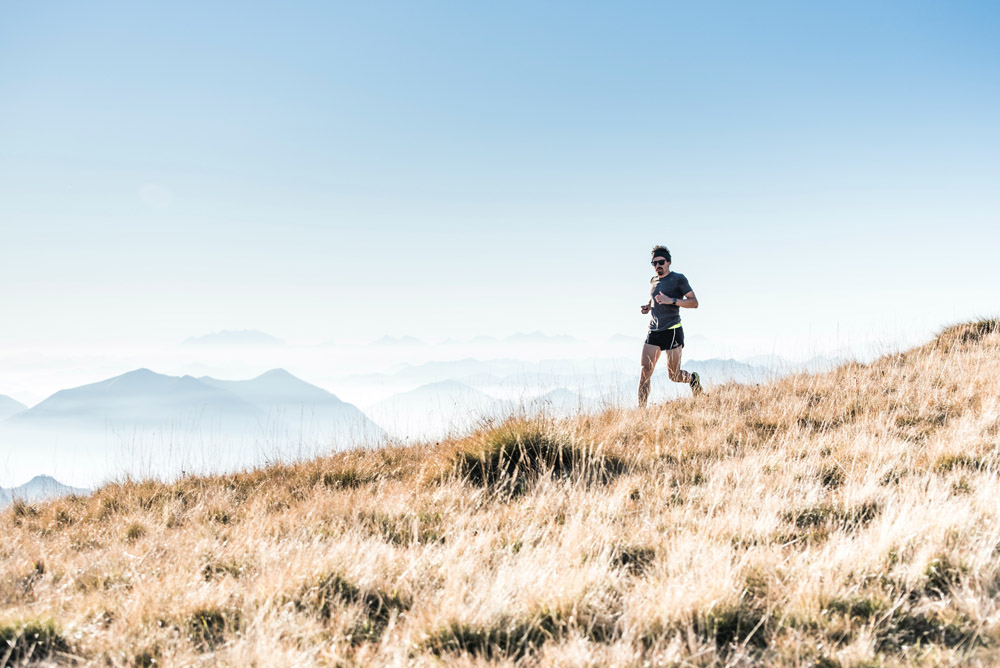Best Diet and Strategy for Athletes to Acclimatize at High Altitude

I have been practicing medicine, living, and doing endurance sports in Colorado since 2002. If you plan on visiting Colorado for athletic training, or anywhere at high altitude, there are some things you should know that will help you acclimatize to the altitude when training between 5,000 and 12,000 feet elevation.
What Athletes Should Eat to Help with Altitude Acclimation
When you are training at higher altitudes, your bone marrow will be going into overdrive making more red blood cells and hemoglobin to meet increased oxygen delivery demands. It is important that blood levels of B12, folic acid, and iron all be in the upper range of normal.
You may notice that foods you used to eat during exercise do not work as well for your body at higher altitudes. Typical symptoms are stomach cramping, gastrointestinal distress, and a feeling that your stomach remains full for too long. Fat burning is diminished as available oxygen levels go down, and foods that contain too much protein or fat can be problematic. Carbohydrate is the preferred energy source at altitude.
When first arriving at high altitude your body uses more blood sugar as a fuel source during rest and during exercise. Muscle glycogen is not decreased but the reliance on fat for energy declines. In other words, fatigue and low blood sugar levels will occur more quickly at the same intensity of activity at altitude compared to sea level if increased carbohydrate intake does not occur. It has been shown in research studies that a diet high in carbohydrates can prevent symptoms of altitude sickness. Lowering fat and increasing carbohydrates while exercising at altitude will provide better exercise benefits. This only pertains to eating during exercise.
The Importance of Fluids in High Altitude Environments
It is easy to become dehydrated in high altitude environments because of all the deep breathing of dry air during exercise. Although you might not be sweating, you are expelling moisture with every breath out. Dehydration decreases exercise performance even if you are just mildly dehydrated. Fluid depletion as low as 2-3% of body mass can affect exercise performance. [1] Increased urinary loss of water also happens because altitude and cold have a diuretic affect. Sweating obviously adds to the water loss.
Try to get one ounce of fluids per kilogram of body weight as a daily basic target. This recommendation is based on the latest scientific studies. I recommend putting a pinch of salt in plain water or using a sports drink. Make sure the sports drink has sodium listed on the label. You can also make your own sports drink by adding 1/2 tsp sea salt, three tablespoons of sugar or honey, and a ¼ cup of fresh lemon or orange juice to one quart of water. There is research that shows that drinking water with higher hardness improves gastric emptying and water uptake to cells. I prefer sport drink powders that have calcium and magnesium in addition to sodium.
Recommended Nutrients for Athletes to Acclimatize at High Altitude
Those who train less often or at lower intensities will have less protection against altitude induced oxidative stress. [2] Highly trained athletes will have already undergone adaptations to higher levels of oxidative stress. This occurs because genes responsible for making antioxidants within the body become more active. Therefore, trained athletes will adapt much easier to altitude training.
Fruits, nuts, seeds, and vegetables contain the needed antioxidants. This means at least six servings of fruit and vegetables per day. A serving is really not very much; usually about half a cup. Important dietary antioxidants which play a role in protection from free radicals (oxidative stress) include vitamin E, vitamin C, vitamin A, flavonoids, polyphenols, and minerals (Zinc, Manganese, Copper, Selenium). For athletes having hard time consuming enough of these foods I recommend a fruits and greens powder.
Vitamin E supplementation at high altitude has shown positive effects in mountain climbers working at 1,600 feet. Tests showed lower levels of oxidative damage as well as a higher exercise performance capacity. Other studies show no effect. A more recent study published in the August 2006 edition of “Medicine and Science in Sports and Exercise” demonstrated that prior treatment with antioxidants could improve ventilatory threshold.
The most common nutritional deficiencies I see are vitamin D and low iron. Low vitamin D is implicated in depression, immune dysfunction, hypertension, coronary artery disease, and may decrease exercise performance. The data is mixed on exercise performance and V02 Max; some data suggests a performance benefit, and in some there is no benefit shown.
Vitamin D is important whether there is performance benefit or not. Vitamin D deficiency is common in Colorado because the sun here is intense, and we apply sunblock or wear clothes to protect our skin. Sun exposure to the face and arms is not enough to prevent vitamin D deficiency.
Preparation and Knowledge is Key for Athletes to Acclimatize
As with any kind of athletic training, preparation and knowledge of what is happening in your body is the best strategy. Another way athletes can ready themselves for training at higher altitudes is to do breathing exercises to improve the muscles of inspiratory and expiratory respiration.
Lastly, I recommend having blood work done (we provide this at NatureMed) to check your red blood cell count, hemoglobin, hematocrit, folic acid, B12, serum iron, vitamin D, total iron-binding capacity, and ferritin. Most often, this type of blood work can go through insurance.
Learn more about our Sports Medicine practice, or our Masters Athlete Physicals
[1] James LJ, Funnell MP, James RM, Mears SA. Does Hypohydration Really Impair Endurance Performance? Methodological Considerations for Interpreting Hydration Research. Sports Med. 2019 Dec;49(Suppl 2):103-114. doi: 10.1007/s40279-019-01188-5. PMID: 31696453; PMCID: PMC6901416.
[2] Higgins MR, Izadi A, Kaviani M. Antioxidants and Exercise Performance: With a Focus on Vitamin E and C Supplementation. Int J Environ Res Public Health. 2020 Nov 15;17(22):8452. doi: 10.3390/ijerph17228452. PMID: 33203106; PMCID: PMC7697466.

